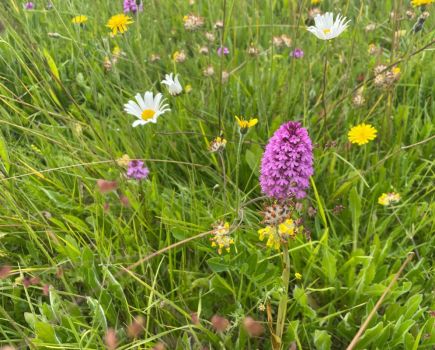Excitement is again mounting for the number one regenerative event of the year as Groundswell approaches. CPM catches up with some of the speakers and discovers what visitors can expect at this year’s festival.
“We want attendees to go away feeling inspired – this is the most important thing to us.”
By Melanie Jenkins
Since 2016, Groundswell has carved out a space in the annual farming calendar as an opportunity to share knowledge, experiences and ideas, and this year promises to fill every attendee’s cup to the brim.
“We’re now calling the event a festival, rather than a show or a conference,” explains event organiser, Alex Cherry. “This reflects that we want people to have fun and a good time, as well as coming to learn and share ideas.
“We’ve also decided not to have an overarching theme this year because we’re working on the principle that regenerative is all encompassing and that everyone adopting it is on a journey. It’s a philosophy, not a definition, because it’s about continuous change that becomes more interesting the more we learn.”
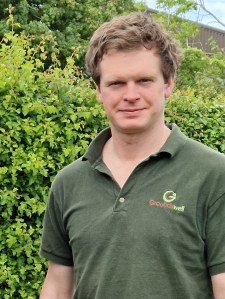
Alex Cherry says Groundswell doesn’t have a theme this year but is aiming to demonstrate that regenerative is all encompassing and that everyone adopting it is on a journey.
Anyone who has attended Groundswell before will be familiar with its talks and seminars providing information on the first principles of regenerative agriculture and there will be sessions along these lines this year, but attendees will now have a chance to go deeper into the subject, says Alex.
“We’re hosting a number of deep-dive and intensive sessions for the first time. Normal sessions last for about an hour but these will be much longer and will provide far greater depth. There’ll be deep-dive sessions on topics such as routes to market and procurement in the public sector.”
Attendees will also be able to hear from Nicole Masters, who Alex feels will be one the most exciting speakers. “Nicole wrote ‘For the Love of Soil’ and is just a really energising speaker. She’s doing a three-hour advanced deep-dive session looking at enhancing underground communications. This will cover microbial signals, plant metabolites, the soil microbiome, the use of compost and how to read landscapes from the above ground indicators. For those who’ve been attending Groundswell for a few years, or are a far way along their regen journey, Nicole is like the Holy Grail.
“Personally, I’m really excited to hear Richard Perkins talk,” says Alex. “Richard is an English farmer who has a small-scale farm in Sweden, where he’s drawn all forms of regen agriculture together. His smallholding includes a no-dig market garden, pasture-based livestock, permaculture and agroforestry. I think he’s a hero in terms of inspiring new entrants to farming and selling produce directly to consumers.”
Other sessions will cover access to land and stacking enterprises. “It’s important we’re looking at farm business models and profitability to rethink how we can achieve this effectively.”
Returning speaker Joel Williams has been absent from Groundswell since the COVID pandemic, but this year he’ll be speaking with Mike Harrington of Edaphos on first principles as well as leading an advanced session on integrated pest and disease management.
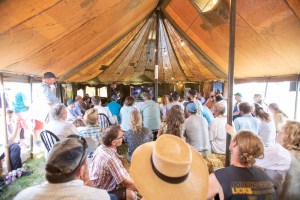
Sessions at the festival will cover topics from first principles of regenerative agriculture to advanced sessions on enhancing underground communications.
Speaking on both days of the festival, Frédéric Thomas is known as a specialist in min-till and direct drilling, and is founder of BASE (Biodiversity, Agriculture, Soil, Environment) in France. According to Alex, Frédéric is ‘a bit of a legend’. “On the first day he’ll be covering ‘Be ready to farm tomorrow’, while the second day will see him talking about carbon, nitrogen, fertiliser and fertility developments in no-till situations.”
There’ll also be time allocated for some lively debates, including one on whether regen ag should be certified or not, with delegates including Helen Browning OBE of the Soil Association, Mike Purnell of Whitbread Farms and Judith Bachelor OBE, deputy chair of the Environment Agency.
Groundswell isn’t just about providing learning opportunities, it’s also acting as a gateway for new entrants, says Alex. “It’s really exciting seeing the number of young people getting involved, especially those from non-farming backgrounds who are exploring agriculture. At Groundswell they’re rubbing shoulders with high calibre attendees, large landowners or farm management businesses – it’s a total dichotomy, but they’re all joining together.”
One of the challenges for the festival team this year has been the sheer number of speaker applications. “We’ve been overwhelmed – absolutely inundated,” says Alex. “The biggest challenge is managing the amount of interest and deciphering the greenwashing as opposed to genuine content.”
Following along the festival theme, this year’s Groundswell will include a few more ‘festival’ type things, he adds. “We are going to have breathing workshops in the mornings, then in the evenings there’ll be different musicians playing, comedy sketches, a regen cheese and wine hour, followed by music late into the night. The days will be packed with making progress which will lead into a relaxed environment in the evenings.”
Unsurprisingly, due to the popularity of the evenings at Groundswell, the glamping and camping areas have increased. And where 5500 people attended the festival last year, Alex says they’re aiming for 6500 this year.
“There’s increasing interest from food businesses, chefs, hospitality, education centres, procurement, supply chains and public services in the festival. And these are the areas really driving the demand for regeneratively produced food.”
This year will see a raft of new exhibitors attending the festival, he adds. “There are a lot of start-ups trying to do clever things with composting, microbes and biostimulants. There’ll also be exhibitors providing soil carbon measurements – the developing carbon industry is an exciting place to be because it provides a lot of opportunities for farming and the industry as a whole.
“The interest we’re seeing is a real positive for farming,” says Alex. “But we want attendees to go away feeling inspired – this is the most important thing to us.”
Speaker deep dive
Visitors to this year’s Groundswell will be able to dive down to the deepest, most technical levels of regenerative farming with a number of tailored sessions.
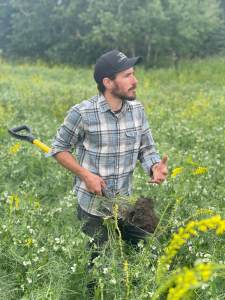
Joel Williams has travelled around the world educating farmers in different landscapes.
Independent educator and consultant Joel Williams has travelled around the world educating farmers in different landscapes. “Soils have been my passion since university 20 years ago when they weren’t fashionable,” he says.
“It’s great to see so much interaction and interest in soils now, and we’re reaching the point where people are acknowledging that it’s the most valuable asset we have. There’s a real desire to be sustainable and take the best care of our soils for future generations.”
Although Joel’s background is in soil chemistry and nutrients, he’s moved into the biology space recently. “I’ve looked at how these interrelate and influence productivity,” he explains. “But I like to cover a wide range of areas, from the different aspects of nutrition to soil and plant health to farming systems.”
So what is it about Groundswell that Joel likes? “I travel all over the world to different events and Groundswell is my favourite. To start, it’s held in the summer and it’s on a working farm with lots of tangible elements which is fantastic to see. Plus the speakers and topics make for such a diverse programme.”
Beyond this, he finds the positive atmosphere at the festival a joy to experience. “There’s an energy and vibe that makes it very special and a pleasure to speak at.”
This year Joel will be taking part in two sessions, one on first principles and the second on integrated pest and disease management. The latter is a deep-dive session which will be presented in two parts of one hour 15 minutes each. “I’m going to explore alternative strategies in farming which can be used to reduce dependency on inputs and create healthier plants.”
The lecture will have three key themes, with the first covering how to design a farming system that doesn’t rely on monocultures. “There are advantages to these systems, but they make it easy for pests or disease to spread,” says Joel. “So by redesigning practices with diversity, we break up any uniformity meaning that not all plants are susceptible to any breakdowns and therefore the entire operation is less vulnerable.”
The second theme of Joel’s session will look at specific strategies relating to microorganisms and soil and plant microbiomes. “I’ll cover how much we can directly antagonise pests and disease with these, how they can consume pathogens and help plants produce their own defence chemicals.”
Finally, he will explore the role of nutrition. “Better optimising nutrition can fuel a plant’s immune system, which can help it create defence chemicals. During this part of the session, I’ll examine how nutrients can have a positive impact on this and how they can undermine it,” he adds.
The second of Groundswell’s advanced sessions will be presented by Nicole Masters of Integrity Soils. This will be the first time Nicole has attended the festival because it falls in the middle of the growing season in the US. “I said to the team two years ago that I’d never come to Groundswell because of the timing but what do you know, never say never.
“I’m really looking forward to meeting the innovators at Groundswell as well as connecting with the community that’s arising in Europe right now.
“I’m an agroecologist, working through the lens of ecology and applying that to agricultural systems. The approach encompasses looking at how water quality, greenhouse gases, animal health and food quality all link to how we’re managing our soil resource. Much of this involves coaching and human behavioural change as well.”
Nicole’s advanced session will be taking a deep dive into harnessing microbial communication to improve outcomes from environmental to profit goals on farm. “There’s an underground metropolis for people to get their teeth into and it’s quite humbling realising how little we still know. It’s like an onion, you can just keep peeling back more and more layers. It’s fascinating how the micro influences the macro so much and I think people are hungry for a more technical understanding of plant microbial communications.
“At the same time, how do we apply this information to farming? It’s about making the science easier to understand and putting it into a form that can be used day-to-day. There’s a good level of foundational knowledge amongst the industry now but farmers are increasingly keen to explore the different aspects of soil systems that impact on their bottom lines. This is the new frontier of research – it’s a very exciting time to be involved in soils because every day there’s something new coming out.”
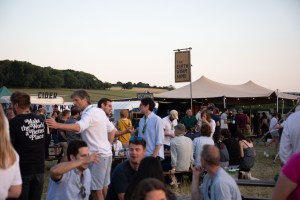
The evenings at Groundswell will involve different musicians playing, comedy sketches, a regen cheese and wine hour, followed by music late into the night.
In Nicole’s work, she explores what these new research discoveries mean for producers. One aspect she’ll be covering in her session will delve into the microbiology of plants. “They are sending chemical signals all of the time – tens of thousands of different types of signals that can set plants up for success, or for disease and pests.
“These signals are how microbes know where their food is, if they’re under threat, whether there’s enough food, or if their plant host is being attacked. These communication signals alter gene expression, so they can change how a plant responds to the environment or how a microbial community reacts. These are things we can harness or degrade through our management of plants and soils.”
There are simple things that can be done on farm to harness this activity and create positive results in crops and soils, explains Nicole. “We can look at what we’re doing with seed dressings or biopriming seeds or think about what impact the chemicals we use are potentially having on plant communication and gene expression. We can consider how issues such as nutritional stress, compaction and water logging can impact plant microbial relationships or how this influences seed germination.
“When we see species like blackgrass showing up, this has germinated in response to a signal. Our landscape is communicating with us, but we have an opportunity to learn how to read it.”
Drill and hoeing demos
A staple feature at Groundswell is its wide array of direct drill demonstrations. Although the commercial element of any machinery demonstration will always be present, demonstrations at the festival are all about showing the audience what each drill is capable of.
Celebrating its 40th anniversary, Amazone will be bringing its 3m Primera DMC large area seed drill to this year’s event. Able to direct drill, mulch and conventionally sow, this trailed machine moves little soil due to its narrow chisel openers, reducing evaporation losses. “The beauty with the Primera is that the chisel openers create a clean slot to place the seed into, so there’s no organic matter or crop residues in the seed slot,” says the firm’s Simon Brown. “This optimises seed to soil contact and as the chisel moves down and inward, it doesn’t rely on huge coulter pressure for penetration.”
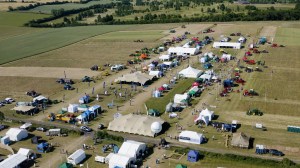
A staple feature at Groundswell is its wide array
of direct drill demonstrations which are all about showing the audience what each drill is capable of.
The machine has a split hopper so starter fertiliser can be applied along with the seed to combat the nitrogen withdrawal which occurs as straw breaks down, and it also helps generate root development, he adds.
The firm also plans to bring its 12m Condor direct tine seeder along with the recently introduced Schmotzer hoe.
Simon feels that Groundswell is securely on the map now. “Amazone was a newbie to the festival last year, so we know more about what to expect and are looking forward to it. The attitudes expressed at the event aren’t just about reducing costs but aimed at improving soils and biodiversity without suffering a yield penalty.
“Everyone is looking to establish their crops better in trickier circumstances in terms of residues, volunteers and weed seed management,” he says. “Groundswell brings together people on the same quest to improve soil health.”
Also joining the line-up at the festival is Claydon, which will be demonstrating its latest model, the 3m Evolution mounted drill.
On its stand, Claydon will have its T4 Hybrid trailed drill, plus its most popular Straw Harrow, the 7.5m mounted version as well as the 9m and the 4.8m TerraBlade interrow hoe.
“We feel that the focus of UK and global farming has shifted to soil health,” says Claydon’s Rachel Durrant. “There’s a lot of attention towards reducing cultivations and preventing soil erosion and water run-off, which is precisely what our system has targeted since its launch in 2003. It’s why we feel it’s so important to be at Groundswell. When we started out, some thought direct drilling was a passing trend or fashion but the drive to improving soil health is definitely here to stay.”
Bringing its Robocrop InRow Weeder to the festival, Garford will demonstrate the capabilities of camera guided hoeing equipment.
Garford also hopes to raise awareness that its inter-row cultivator isn’t just for hoeing vegetables and salads, but also for combinable crops on 15-25cm row widths, says the firm’s Allan Knight. “The beauty of hoeing is that it can be done unlimited times, unlike chemical applications.”
A wheat crop has been planted for Garford to demonstrate its machine. “The machines are bespoke so are configured based on what farmers are trying to do. Hoeing is a new environment for many, so it’s great to be able to demonstrate it and we feel that Groundswell fits our direction towards sustainable farming, which is why we attend,” he adds.
Horsch will be demonstrating its 6m Avatar disc drill, which comes with a choice of different hopper configurations and is available from 3m to 18m. The 5000-litre tank capacity is set at a 60:40 split, allowing for multiple products to be applied at once, and a further third hopper can be added to extend versatility.
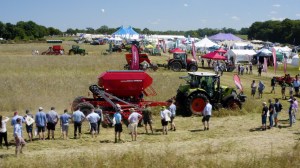
Horsch will be demonstrating its 6m Avatar disc drill, which comes with a choice of different hopper configurations.
Mzuri has a comprehensive line-up planned for the festival, which includes its Pro-Til iGen one pass drill, which will be demonstrated on a Case Puma 240. Further to this, the Pro-Til 4T and 3T drills, plus the 4m Rehab low surface disturbance subsoiler, the Rezult straw rake and the Razorback flail mower will be on display.
Visitors to Groundswell will again have an opportunity to see Opico’s Sky Easy Drill. Available in 3m, 4m, 6m and 8m models, it can drill into cultivated ground, whether ploughed and pressed, or into min-tilled land, as well as directly into a cover crop.
Returning to the festival is Samagri, bringing the Virkar direct drill to demonstrate. The Virkar is now available in four versions, the DC (Disc & Coulter), D (Disc), C (Coulter) and DD (Double Disc), with all variants available in 4.5m, 5.6m and 7m options.
Further demonstrations will be performed by Dale Drills, Horizon, John Deere, Simtech UK, Sumo, and Weaving.
Other demonstrations will include, muck spreading, broadcasting spring cereals from a homemade drill – which ties in with a seminar entitled, ‘I made it myself’.
This is a session aimed at those who are new to the agro-ecological movement or who just want an overview of the principles of regenerative agriculture – why to adopt them and how to implement them.
Session line-up at Groundswell
Below, CPM has picked out some of the most note-worthy sessions from across the two days. The full sessions programme can be found online – https://groundswellag.com/sessions/
| Session | When? | Where? | What? | Speakers? |
| First principles | 28 June
10:00 – 11:00 and 29 June 9:00 – 10:00 |
Big Top | This session is aimed at those who are new to the agro-ecological movement or who just want an overview of the principles of regenerative agriculture – why to adopt them and how to implement them. | · Joel Williams, Integrated Soils (28 June)
· Mike Harrington, Edaphos · Andrew Lingham, Farmer · Nicole Masters, independent agroecologist and author (29 June) |
| How to feed your soils biologically | 28 June
10:00 – 11:00 |
Discussion Tent | A panel discussing how to feed your soils biologically – looking at Climate Compost, bokashi, brewing microbes, using microscopes on farm and farming biodynamically. | · Bridget Elworthy, The Land Gardeners
· Henrietta Courtauld, The Land Gardeners · Andrew Sincock, Agriton · Jeff Allen, Microbz · Jane Scotter, Farmer · Tom Fairfax, Farmer |
| Linking soil health and potato production | 28 June
10:00 – 11:00 |
Speaker’s Corner | Highlighting the ability to grow potatoes in a regenerative way, producing good quality yields using soil analysis, management, reduction in inputs but maintaining yields. | · Ian Robertson, Sustainable Soil Management
· John Bubb, Farmer · James Young, McCain · Richard Harding, Farmer · Ed Brown, independent agronomist |
| Is it time to certify regenerative agriculture? | 28 June
10:00 – 11:00 |
Seminar Tent | This session will feature voices both in favour and against the idea of certifying ‘regeneratively farmed’ produce. Would a regenerative certification limit farmers, impede innovation, and wrap them up in additional bureaucracy, or will it create clarity for consumers looking to make good choices in the food and fibre they buy? | · Helen Browning OBE, Soil Association
· Mike Purnell, Farmer · Judith Batchelar OBE, Environment Agency · Catherine Chong, ecology, social and governance advisor · Baroness Rosie Boycott, journalist and editor |
| Rotation – Mind the gap! | 28 June
11.30 – 12:00 |
AHDB Stand (DF C30) | In search for the ultimate, “alternative” break crops. This house believes that there is a profitable “alternative” break crop for every farm system. From hemp and chia to forage. | · John Pawsey, Farmer
· Andy Bason, Farmer · Alice Andrews, farm consultant · James Standen, Newcastle University Farms |
| Be ready to farm tomorrow! | 28 June
12:00 – 13:00 |
Discussion Tent | We are living in a very turbulent world and so is the agriculture business – with the added pressure of weather uncertainty. Nevertheless, Conservation Agriculture not only brings savings and innovations, but a lot of resilience too.
With large fields of opportunities still to explore, it’s surely setting farm activities on the right agronomical, economical and environmental coherence. |
· Frédéric Thomas, specialist in min-till and direct drilling and founder of BASE |
| Human scale regenerative farming | 28 June 13:45 – 15.15 | Big Top | Richard Perkins built up the influential Ridgedale Farm on a shoestring budget in the harsh climatic, regulatory and economic conditions of Sweden. Here he breaks down his approach to land planning, economics and management necessary to make small farms thrive. Richard integrates holistic management, keyline design and various other ecological design approaches in his work, and has designed farms of all scales across 4 continents. | · Richard Perkins, Farmer and author |
| Integrated pest and disease management (advanced session)
Part 1 and 2 |
28 June
14:00 – 15.15 and 15:45 – 17:00
|
Soil Tent | Part 1 of the lecture will start with a focus on designing with diversity. After this foundation, it will move onto the microbiome and highlight how beneficials that live around, on or in plants can either directly antagonise pests and disease or induce the production of defence chemicals within the plant.
Part 2 of the lecture will specifically focus on the role of nutrition in supporting plant defences. |
· Joel Williams, Integrated Soils |
| Intercropping – practical lessons | 29 June
11:00 – 12:00 |
Old Dairy Tent | This session is an opportunity to learn from experienced practitioners about the range of crops that can be teamed up together, what works and what doesn’t. It covers the practicalities of taking the crops the whole way through from drilling to harvest to marketing. | · Ben Adams, Farmer
· Andy Cato, Farmer · Jerry Alford, Farmer · David White, Farmer |
| There is not Planet B – The implications for food and farming | 29 June
11:00 – 12:00 |
Soil Tent | A leading thinker on carbon metrics, climate change and sustainability, Prof Mike Berners-Lee shares his insights on the scale and urgency of the climate emergency the world is facing. He takes a big picture perspective, advocating the need for farming and food systems to undergo systemic change. From both a UK and global perspectives, he sheds light on the harmfulness of offsetting and greenwashing, and the need for respect and truthfulness in societal and governance systems. | · Prof Mike Berners-Lee, Lancaster University, Small World Consulting
· Dr Hannah Wright, Small World Consulting |
| Enhancing underground communications (advanced session)
Parts 1 and 2 |
29 June
13:00 – 14.15 and 14:45 – 16:00
|
Soil Tent | These two sessions will dive deep into microbial-plant communications, covering topics such as plant metabolites, enzymes and the soil-gut microbiome. How can the use of compost/vermicast extracts switch microbial communities on/off? How can we learn to read landscapes by listening to what above-ground indicator plants are saying? | · Nicole Masters, independent agroecologist and author |
| Carbon, nitrogen, fertility development and fertilisation management in no-till | 29 June
15:00 – 16:00 |
Big Top | Usually, conservation agriculture leads to soil organic matter improvement and the extension of the soil live with positive return in terms of fertility, water management and productivity with lower costs of production. Nevertheless, the reduction of the mineralisation brought by tillage associated to the N immobilisation in the biomass of cover-crops and the growth of the soil life can slow the returns. To avoid these risks of drawback, it’s necessary to understand those different factors and the relations in between them in order to adapt fertilisation programs in consequences. | · Frédéric Thomas, specialist in min-till and direct drilling and founder of BASE |
| Closing party: Dirty talk | 29 June
17:45 – 18:45 |
Earthworm Arms Big Top | You listened, you digested, you’ve absorbed two days of all there is to know about soil, compost, nematodes, sustainable fibres, healthy food, and educating the youth, and are inspire. Now, where to share that newfound knowledge? Come mix and mingle, with the brightest, most energetic minds and get connected for some Dirty Talk, hosted by Wildfarmed. | · |
Event information
Groundswell will be held in Hertfordshire on 28-29 June 2023. The Earthworm Arms Bar opens at 4:00pm on Tuesday 27 June (set up day) and 8:00am on Wednesday and Thursday. Other catering will be available on both days of the festival. The Campsite is open from 4:00pm on Tuesday 27 June. Location: Lannock Manor Farm, Hertfordshire, SG4 7EE. Tickets are still available online at www.groundswellag.com.
This article was taken from the latest issue of CPM. For more articles like this, subscribe here.
Sign up for Crop Production Magazine’s FREE e-newsletter here.GroundswellJun23 


